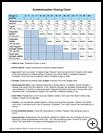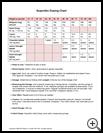
Hand, Foot, and Mouth Disease
What is hand, foot and mouth disease?
Hand, foot, and mouth disease is a disease caused by a Coxsackie virus. Children 6 months to 4 years old are most at risk. The disease happens most often in the summer or fall.
Your child may have hand, foot, and mouth disease if your child has:
- Small, painful sores in his mouth that are sometimes too small to see
- Small water blisters or red spots on the palms of his hands and soles of the feet. You may also see these on the fingers and toes. A rash that’s mainly on the hands and feet is what makes this diagnosis.
- Five or fewer blisters on each hand or foot
- Fever between 100°F and 102°F
- Blisters that spread to the forearms, lower legs, and face (may be a sign of a more severe form of the disease)
The fever goes away by the 3rd day. The mouth sores go away in 7 days. The rash on the hands and feet can last 10 days.
How can I take care of my child?
Helping the pain from mouth sores.
- If your child is very young, put 1/2 teaspoon antacid solution in the front of the mouth 4 times a day after meals.
- Children over age 4 can use 1 teaspoon of an antacid solution as a mouthwash after meals.
- Give acetaminophen or ibuprofen if your child's mouth really hurts, or for fever over 102° F. Avoid aspirin in children and teens.
Feeding your child.
- Give soft foods, like yogurt, cottage cheese, and Jell-O.
- Use a cup instead of a bottle.
- Cold drinks, milkshakes, Popsicles, and sherbet can feel good.
- Stay away from citrus, salty, or spicy foods.
Spreading hand, foot, and mouth disease.
- Your child's playmates may get the disease in 3 to 6 days.
- Your child may go back to school when the fever goes away.
- In the type with lots of blisters, your child should stay home until the blisters dry up.
Call your child's doctor right away if:
- Your child has not urinated for more than 8 hours.
- Your child gets a stiff neck.
- Your child acts very sick.
Call your child's doctor during office hours if:
- The fever lasts more than 3 days.
- You have other concerns or questions.
Written by Barton D. Schmitt, MD, author of “My Child Is Sick,” American Academy of Pediatrics Books.
Pediatric Advisor 2018.1 published by Change Healthcare.
Last modified: 2016-06-01
Last reviewed: 2017-06-05
Last modified: 2016-06-01
Last reviewed: 2017-06-05
This content is reviewed periodically and is subject to change as new health information becomes available. The information is intended to inform and educate and is not a replacement for medical evaluation, advice, diagnosis or treatment by a healthcare professional.
Copyright ©1986-2018 Barton D. Schmitt, MD FAAP. All rights reserved.


